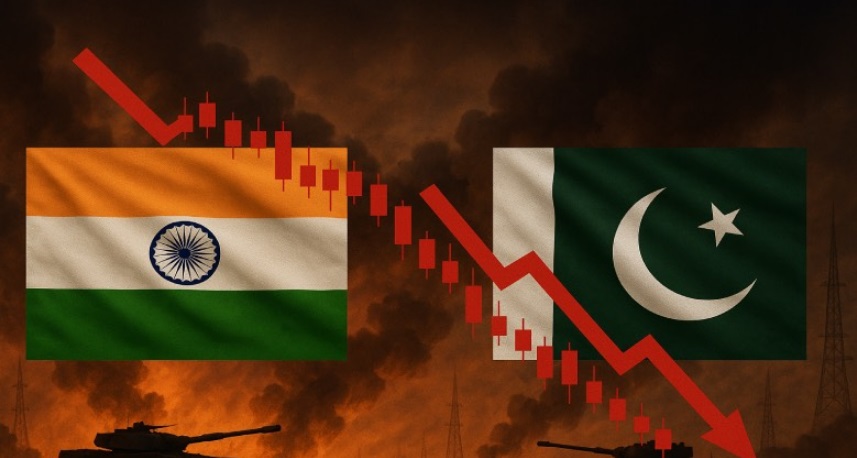
Could India-Pakistan Tensions Trigger a Major Stock Market Slide?
Operation Sindoor is characterised by its focused and non-escalatory approach, aimed at known terror camps without civilian casualties.
Market reactions have been muted, with fluctuations in indices, but no significant downturn is expected due to the measured response, according to analysts.
Operation Sindoor: The India-Pakistan conflict has escalated to new heights after India carried out its deepest strikes inside Pakistani territory since 1971. India said early Wednesday that it launched ‘Operation Sindoor’, conducting “a precise and restrained response” that was “designed to be non-escalatory in nature” and only targeted “known terror camps” and hit no Pakistani civilian, economic or military targets — a statement disputed by Pakistan.
Operation Sindoor is India’s responses to the Pahalgam terror attack that killed at least 26 people. The Indian stock market appears to be largely unaffected by this fresh flare-up of tensions between India and Pakistan.
The Sensex opened 692 points lower at 79,948.80 against its previous close of 80,641.07, but soon erased losses to rise over 200 points to the level of 80,845. The index was volatile as around 10 AM, the 30-share pack was 32 points, or 0.04 per cent, down at 80,609. The Nifty 50 was 19 points, or 0.08 per cent, lower at 24,361 at that time. The BSE Midcap index was flat, while the BSE Smallcap index was down 0.33 per cent.
Operation Sindoor: How could escalating India-Pakistan conflict impact the Indian stock market?
While experts believe tensions between India and Pakistan may weigh on the market sentiment, they do not expect the market to see a sharp downside due to it.
They point out the focused, measured, and non-escalatory nature of Operation Sindoor, which avoided Pakistani military or strategic sites.
“What stands out in ‘Operation Sindoor’ from the market perspective is its focused and non-escalatory nature. We have to wait and watch how the enemy reacts to these precision strikes by India. The market is unlikely to be impacted by the retaliatory strike by India since that was known and discounted by the market,” said VK Vijayakumar, Chief Investment Strategist, Geojit Investments.
Also Read | India’s Economic Growth to Stay Strong Despite Global Trade Headwinds
As Operation Sindoor was a pure retaliation, aimed solely at terror camps, the message is clear: India does not seek to escalate tensions.
Experts, however, believe there could be some reaction from Pakistan to save its face.
“There could be some reaction from Pakistan, as it may feel the need to save face. We have to wait and watch. That said, Pakistan does not have the economic muscle to sustain a prolonged conflict,” said Vijayakumar.
India-Pakistan tensions and Indian stock market: What does history suggest?
The Indian stock market has historically been resilient during times of geopolitical tensions, largely due to a strong domestic economy.
For example, from May 3, 1999, to July 26, 1999, during the Kargil war, the Indian market showed resilience and experienced a slight decline of 0.8 per cent.
During the two days of the Mumbai 26/11 terror attack in 2008, the Sensex climbed by around 400 points, while the Nifty gained 100 points.
The Indian stock market responded negatively to the Pulwama attack in 2019, with indices dropping more than 1.8 per cent from February 14 to March 1.
“Market responses may be muted during times of Indo-Pak conflict. The domestic market has never panicked during such episodes, as India holds a clear advantage in a conventional war. The situation would be very different in the event of an India-China conflict,” Vijayakumar explained.
Trivesh D, COO of Tradejini, also underscored that historically, India-Pakistan tensions or even full-blown conflicts haven’t derailed long-term performance.
“Take the Kargil War in 1999: between 23rd May and 26th July, the Sensex surged 37 per cent. During the Pulwama attack in February 2019, the Nifty fell just 0.2 per cent the next day, dipped again after the air strikes, and then resumed its uptrend. Even after the Uri attack in 2016, the market was down 1.76 per cent post-surgical strikes but was already in a broader downtrend,” said Trivesh.
“The increased uncertainty surrounding India–Pakistan tensions will inevitably cause turbulence in the market, but history indicates that corrections are typically mild and quickly rebound. A focused approach rooted in quality companies and selective sector play is the key,” said Rajesh Sinha, Senior Research Analyst at Bonanza Group.
What should be your investment strategy?

Experts say investors should avoid panicking and focus on large-caps, which are relatively more stable than the mid- and small-cap segments.
Moreover, a diversified portfolio and focus on domestic consumption-oriented sectors may help investors efficiently navigate market volatility.
“Even as small-cap and mid-cap segments could lag as a few investors turn defensive amid border tensions, the situation offers a compelling opportunity to be overweight in quality large-cap stocks,” said Sinha.
Also Read | Global Media Reacts to India’s ‘Operation Sindoor’ on Pakistan Terror Camps
Sinha suggested investors should prioritise sectors that show strength in the face of volatility, including leading banks with solid capital cushions.
Moreover, Sinha pointed out that FMCG companies enjoy inelastic demand, and defence contractors can benefit from heightened budgetary allotments.
Trivesh of Tradejini said one should keep an eye on defence and infrastructure.
“These typically attract more attention during such times. Pharma and FMCG also act defensively, cushioning shocks when sentiment turns cautious. And if crude prices surge, energy stocks could react positively,” he said.
Trivesh emphasised avoiding knee-jerk buying based on fear or news flow and staying aligned with the broader trend and use any dips to enter quality names.
Vijayakumar of Geojit Investments underscored that at this juncture, there is no deep value in any sector, with Nifty’s valuation trading above 20 times its FY26 earnings. However, despite the run-up, the financial sector’s prospects remain bright.
He said the telecom sector also looks promising at this point, while the defence sector may witness a sentimental boost, but it lacks deep value, even though it offers some long-term potential.


